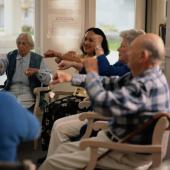Cognitive Impairment Declining in Older Adults
Education, wealth play big part in downward trend, study suggests.
|
E-mail this article
Subscribe to news
Printer friendly version
|

(SOURCE: University of Michigan, news release, Feb. 20, 2008)
WEDNESDAY, Feb. 20 (HealthDay News) -- Memory loss and thinking problems are becoming less common among older Americans, possibly due to better education, personal wealth and cardiovascular care, a new study suggests.
Published online Feb. 20 in Alzheimer's & Dementia, the national study of 11,000 people aged 70 and older found the rate of cognitive impairment (the umbrella term for everything from major memory loss to dementia and Alzheimer's disease) declined from 12.2 percent to 8.7 percent between 1993 and 2002.
The reasons for the decline aren't fully known, but the researchers noted that older Americans are more likely than their predecessors to have more formal education, higher economic status, and better care for cognitive impairment risk factors such as high blood pressure, high cholesterol and smoking.
The findings support recent theories of how brains can be protected and preserved as people age, according to lead author Dr. Kenneth Langa, an associate professor of internal medicine at the University of Michigan Medical School.
"From these results, we can say that brain health among older Americans seems to have improved in the decade studied, and that education and wealth may be a big piece of the puzzle," Langa said in a prepared statement.
"We know that mental stimulation has an impact on the way a person's brain is 'wired,' and that education early in life likely helps build up a person's cognitive reserve. We also know cardiovascular health has a close link with brain health," he noted. "So what we may be seeing here is the accumulated effects of better education and better cardiovascular prevention among the people who were over age 70 in 2002, compared with those who were over age 70 in 1993."
The analysis conducted by Langa and colleagues suggests that about 40 percent of the 3.5 percent decrease in cognitive impairment between 1993 and 2002 was the result of increased education and personal wealth.
They also noted that the use of cholesterol-lowering and blood pressure drugs, along with other preventive cardiovascular medications and strategies, increased dramatically in the 1990s. This may have helped protect older adults' brain function by decreasing the incidence of vascular dementia -- cognitive problems caused by mini-strokes, strokes and decreased blood flow to the brain due to clogged arteries.
More information
The American Psychological Association has more about memory changes in older adults. 
Copyright © 2008 ScoutNews, LLC. All rights reserved. 
HealthDayNews articles are derived from various sources and do not reflect federal policy. healthfinder.gov does not endorse opinions, products, or services that may appear in news stories. For more information on health topics in the news, visit the healthfinder.gov health library.